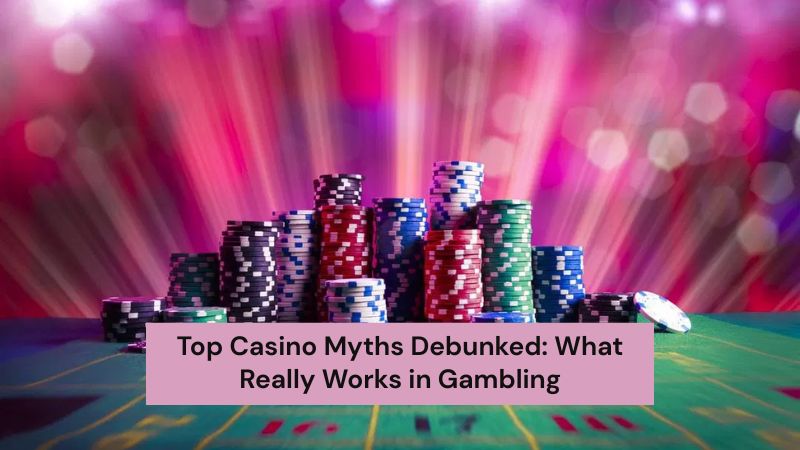Casinos are exciting places filled with flashing lights, spinning reels, and the sound of coins dropping. But alongside the fun, there are also plenty of myths floating around. Many people believe in certain “lucky” strategies or tricks that they think will help them win big. The truth? Most of these ideas are simply myths. In this post, we’ll break down the top casino myths and reveal what really works in gambling.
Myth 1: Casinos Are Rigged to Make You Lose
This is one of the most common myths. While it’s true that casinos are businesses designed to make a profit, it doesn’t mean they’re cheating. Every game in a licensed casino is designed with a built-in house edge—a small advantage that ensures the casino makes money over time.
What really works: Understand the house edge. Games like blackjack, baccarat, and craps have lower house edges, which means better odds for players. Choosing these games can help stretch your budget and improve your chances.
Myth 2: Hot and Cold Slot Machines Exist
Many gamblers believe that slot machines go through “hot” streaks when they pay out a lot, and “cold” streaks when they don’t. This leads players to jump from machine to machine, hoping to find the “hot” one.
What really works: Know that slot machines are random. Modern slots use Random Number Generators (RNGs) to determine each spin. Each spin is independent, so there’s no pattern or “hot streak” to follow. Focus on having fun, and set limits to avoid overspending.
Myth 3: You Can Beat the System with Betting Systems
Some players rely on systems like the Martingale (doubling your bet after every loss) or other progressive betting strategies to try and beat the odds.
What really works: Know your limits. Betting systems don’t change the house edge, and they can lead to big losses quickly. Instead, stick to a budget, manage your bankroll wisely, and only bet what you’re comfortable losing.
Myth 4: Dealers Control Who Wins in Table Games
Some people believe that the dealer can control the outcome of games like blackjack or roulette, giving or taking wins on purpose.
What really works: Understand how the games are run. Dealers follow strict rules and have no control over the outcome of cards or roulette spins. Trust the game rules and focus on making smart decisions based on strategy, not superstition.
Myth 5: Card Counting Is Illegal
Card counting is a technique used in blackjack where players keep track of high and low cards to improve their chances. Many believe it’s illegal.
What really works: Card counting is not illegal—but casinos don’t like it. If you’re caught counting cards, the casino can ask you to leave, but you won’t be arrested. Still, it’s not an easy trick and requires practice and focus.
Myth 6: Online Casinos Don’t Pay Real Winnings
A lot of people think online casinos are scams and that players never actually get paid when they win.
What really works: Play at licensed and reputable online casinos. Regulated casinos are required to pay out winnings fairly. Before signing up, check for licenses from trusted authorities (like the UK Gambling Commission or Malta Gaming Authority) and read user reviews.
Myth 7: Using a Players Card Reduces Your Odds
Some gamblers think that using a loyalty or player’s card at a casino affects their chances of winning, believing the casino will “tighten” the machines to stop them from winning.
What really works: Players cards don’t affect game results. These cards only track your play for rewards like free drinks, meals, or hotel stays. They don’t impact your odds or machine payouts, so you might as well earn the extra perks!
Myth 8: A “Near Win” Means You’re About to Hit the Jackpot
Slot players often see two jackpot symbols on the reels and think, “I almost won—it’s going to hit soon!”
What really works: “Near wins” are just part of the game. They’re designed to create excitement, but they don’t mean a jackpot is coming. Each spin is random, and the chances stay the same no matter what happened before.
Myth 9: You Have Better Odds Late at Night
Some believe that casinos pay out more at night to attract crowds or that they loosen machines during certain hours.
What really works: Time of day doesn’t change the odds. Whether you play in the morning, afternoon, or night, your odds remain the same. It’s better to play when you’re alert and focused rather than chasing “lucky” hours.
Myth 10: Big Wins Are Due to Luck Alone
While luck plays a huge role in gambling, many players underestimate the value of learning strategies, especially in games like poker or blackjack.
What really works: Skill can help—depending on the game. In skill-based games like poker and blackjack, learning basic strategies or studying the game can improve your performance. In games of pure chance (like slots or roulette), luck is the main factor.
Bonus Myth: You Can Tell When a Machine Will Hit
Some gamblers watch how often a slot machine pays out, thinking they can predict the next big win.
What really works: You can’t predict a slot’s behavior. Slots use RNGs that generate thousands of outcomes per second. The moment you press “spin” is what determines your result—there’s no pattern to follow.
How to Really Improve Your Gambling Experience
Now that we’ve debunked the most common myths, here are a few simple tips that actually help you gamble smarter and safer:
- Set a budget and stick to it. Never gamble more than you can afford to lose.
- Take breaks. Step away from the game to stay focused and make better choices.
- Know the rules. Learn how the games work before betting real money.
- Use bonuses wisely. Take advantage of casino promotions, but always read the terms.
- Play for fun. Remember, gambling should be entertainment—not a way to make money.
Final Thoughts: Facts Over Fiction
Gambling is a thrilling experience, but don’t let common myths cloud your judgment. The truth is, there’s no magic formula to guarantee wins. By understanding how games really work and avoiding false beliefs, you can make smarter choices and enjoy a better casino experience.
So next time you hit the slots or sit down at a blackjack table, leave the myths behind—and play with knowledge, not superstition!










